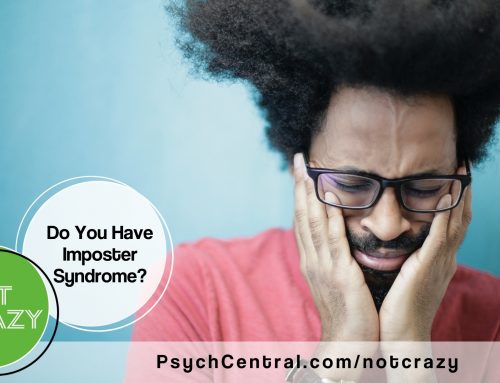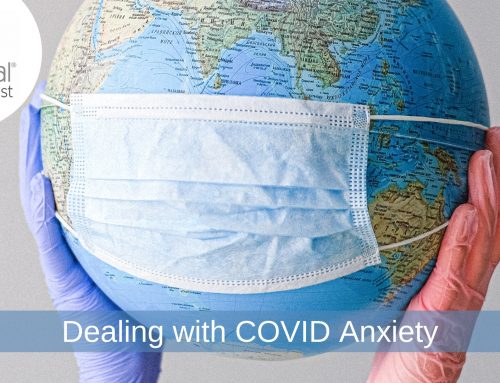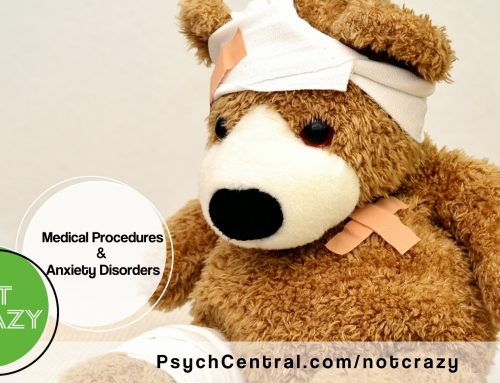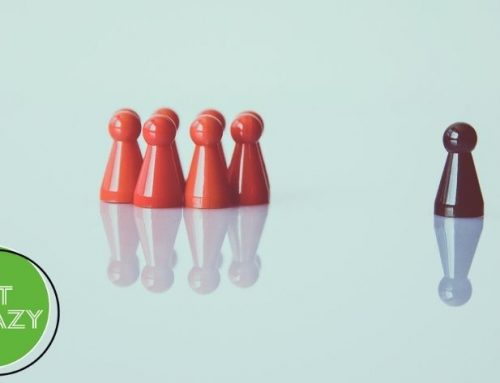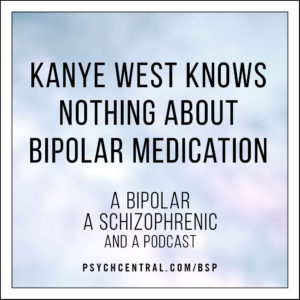
Kanye West’s interview about living with bipolar disorder has recently made the media rounds. Mr. West speaks about not liking medication, about mania being a creative outlet, and the career edge he believes he has because of living with mental illness.
Suffice to say, whenever someone gains an audience by speaking about living with bipolar disorder, our hosts are going to take notice. Do they agree with Mr. West? Listen now to find out.
SUBSCRIBE & REVIEW


“Do you know many homeless schizophrenics who are eating well?”
– Gabe Howard
Highlights From ‘Kanye West Bipolar’ Episode
[1:00] Kanye West’s interview on ‘My Next Guest Needs No Introduction.’
[4:00] David Letterman tells his story about mental illness.
[12:00] What is Akathisia?
[19:00] Talking about bipolar mania.
[22:00] Should we take mental health advice from famous people?
Computer Generated Transcript for ‘Kanye West Bipolar Disorder’ Show
Editor’s Note: Please be mindful that this transcript has been computer generated and therefore may contain inaccuracies and grammar errors. Thank you.
Announcer: For reasons that utterly escape everyone involved, you’re listening to A Bipolar, a Schizophrenic, and a Podcast. Here are your hosts, Gabe Howard and Michelle Hammer.
Gabe: Welcome to this episode of A Bipolar, a Schizophrenic, and a Podcast. I’m Gabe, bipolar.
Michelle: And I’m schizophrenic. I’m Michelle and I am not as loud as Gabe apparently.
Gabe: That’s unusual.
Michelle: Unusual I’m usually the loudest person but I think you just won, okay, and whatever that was.
Gabe: Let’s talk about loud mentally ill people that maybe shouldn’t be as loud as they are.
Michelle: Why who could you be talking about, Gabe? I can’t possibly think of someone that’s a bit loud in the mental health field that makes it on all of the news just kind of ruins it a little bit for all of us I’d say.
Gabe: It’s really sad because it he’s got a platform. I mean whenever he talks about living with bipolar disorder the media immediately reports it. And as a guy who, one, lives with bipolar disorder and two wants to talk about living with bipolar disorder and three can’t get the media to report shit there’s this massive anger and jealousy that comes from what he chooses to say.
Michelle: Do you think people have figured out who we’re talking about?
Gabe: You know it depends on if they have Netflix or not and if they know who the fuck David Letterman is.
Michelle: We’re talking about Mr. Kanye West.
Gabe: And Kanye West, we’ve talked about on the show before when we’ve talked about celebrities but he has a new interview with David Letterman on what’s it called? This next guest needs no introduction?
Michelle: Yeah.
Gabe: And he talks about a lot of things. Let’s not throw away the entire interview. First off if you are a fan of Kanye West if you’re a fan of his music, his creative pursuits, his endeavors, they spend the majority of the time talking about that but of course there’s this the section where they talk about.
Michelle: When he discusses mental health and medication.
Gabe: And when he discusses living with bipolar and the creative process.
Michelle: And living with bipolar. But one specific part really got to me one key part was good is that he wasn’t putting down people taking meds but the reason that he doesn’t take any meds. One of the main reasons was because they made him fat. The second reason he doesn’t like taking meds, is because it “stifles his creativity.” And that was a huge reason about why I didn’t want to take meds when I was younger when I was around 18 or 19 starting meds in college. I would say that I’m taking these meds and I was an art major and it was ruining my artwork and I couldn’t do my artwork anymore because of the meds or I couldn’t play lacrosse good anymore because of the meds. I would come up with all these excuses and I would blame medication and I’d say I’m just going to not take my medication anymore it’s ruining everything.
Gabe: You know what really stifles creativity and ruins everything? Dying by suicide.
Michelle: True.
Gabe: That really just stifles just I mean pretty much life. This is why these conversations always sort of irritate me. Nobody is taking medication because they’re not really sick. The people who are being prescribed medications for mental illness their quality of life is in the toilet man it just kind of irritates me because everybody thinks that people who are taking psychiatric medications are just like they’re perfectly fine. They just have like maybe little issues here and there no people who are being prescribed psychiatric medications are really sick. They have suicide attempts. They’re cutting and they have homelessness. In serious cases of violence or attacks against others you were hallucinating and you were so paranoid that you thought your mother was trying to kill you. But what you were worried about was that your creativity was going to be stifled.
Michelle: Yes exactly. Exactly. Exactly.
Gabe: It’s almost like you weren’t thinking straight.
Michelle: What if Kanye West wasn’t a rich person right now? What if he was poor? What if he was homeless?
Gabe: It’s interesting because let’s not pick on Kanye West the whole time. You know David Letterman said something that I thought was really really interesting. He said that for a long time he, David Letterman, didn’t take any medication or help for his mental illness but that he was so angry and paranoid and frustrated that he used to rip phones off the wall and throw them against other walls and it would take two or three days to calm down from these angry outbursts. And then he did this at work for 10 years before realizing that he needed medication. Now, Michelle, as somebody who’s been fired from 11 jobs.
Michelle: 8.
Gabe: 8 jobs. How many of those jobs did you rip something off the wall and throw it against the wall in front of your co-workers?
Michelle: Zero.
Gabe: Ok. And you still couldn’t keep a job because of your schizophrenia?
Michelle: Yes.
Gabe: Yeah but apparently this guy could keep his job in spite of being I don’t know what crazy, and I don’t say that lightly. It’s just he was so sick and so angry and so symptomatic he was putting other people in danger and his workplace covered for him.
Michelle: Right.
Gabe: Because he was David Letterman.
Michelle: Right. He was saying that he got this far, at this point in his life not being on meds, why does he need meds now? It’s going to change who he is and then he said that after doing all that his doctor finally said can you just try them now? please? And then when he took them it was a whole new way of life. It was like wearing new glasses.
Gabe: And this was frankly an elite figure talking somebody who’s famous, on television, wealthy, has a lot of resources, and he now sees the benefit of getting the proper treatment for mental illness and the rest of us we don’t we don’t have that kind of coin. I don’t think that I could throw a phone at you, Michelle, and keep our podcast.
Michelle: Oh, hell no.
Gabe: Let alone doing this so often for a decade that the doctor has found out about it. It’s like I don’t know, David, I don’t think you should throw phones at people anymore. Maybe you should just try it? Could you imagine having that? The rest of us would go to jail.
Michelle: You know what’s really funny? Everybody knows that Naomi Campbell threw a phone at her assistant and nobody knows that David Letterman used to rip phones out of the wall and thrown them at people or whatever like that. Come on? Men versus women. Come on. That’s it. I’m turning this in to. That’s a bit sexist, Gabe.
Gabe: I thought this podcast was about how we were angry at people for spreading misinformation about psychiatric medications. We now have to discuss misogyny too?
Michelle: It always is misogyny. You always hear about the difficult women you never hear about the difficult men.
Gabe: You’re right. For example when we heard about it from Naomi Campbell we just thought that she was a bitch. We just thought that she was mean and angry. But when we heard about it from David Letterman, we thought he was sick. So this is just another reason why this medication conversation really needs to be more nuanced and more understood because imagine if Naomi Campbell needed medication but her doctor wouldn’t sit her down and discuss it? Because a doctor is not going to tell you you’re a bitch. But a doctor did tell a man that he was mentally ill. So it could have been that much longer before Naomi Campbell got the help that she needed because she wasn’t looked at as symptomatic. She was looked at as evil and unhinged, and, well female.
Michelle: Well do we even know what the Naomi Campbell does have a mental illness?
Gabe: I honestly don’t know. But I guarantee that her doctors aren’t talking to her about it. We’ve all just rolled our eyes that she’s just some crazy person that throws phones at and by crazy I don’t mean like mentally ill crazy. I just mean like you know just mean.
Michelle: Just, yeah.
Gabe: Whatever. And that’s just so sad because maybe she is symptomatic? I don’t know if she has a mental illness or not. But you know David Letterman threw a phone. He’s mentally ill. She threw a phone. Maybe she’s mentally ill? Or maybe David Letterman is just an asshole that throws phones?
Michelle: Hold up. We have to hear from our sponsor.
Announcer: This episode is sponsored by BetterHelp.com. Secure, convenient, and affordable online counselling. All counselors are licensed, accredited professionals. Anything you share is confidential. Schedule secure video or phone sessions, plus chat and text with your therapist, whenever you feel it’s needed. A month of online therapy often costs less than a single traditional face to face session. Go to BetterHelp.com/PsychCentral and experience seven days of free therapy to see if online counselling is right for you. BetterHelp.com/PsychCentral.
Michelle: And we’re back talking about bipolar in the media.
Gabe: You are right. We give men a lot of cover and we’re giving Kanye a lot of cover because we think that he’s brave for talking about living with mental illness so publicly. But let’s dissect that message for a moment. His message is if you have bipolar disorder, you don’t want to ruin your mind by taking medication. So therefore don’t take them. Now for a multi-millionaire platinum selling rapper, maybe this is the best decision. But the majority of the people hearing his message are not famous multi platinum selling artists.
Michelle: And that’s why it’s dangerous for him to be saying these things.
Gabe: Exactly.
Michelle: And the other comment he said was that he didn’t say this word for word but he did make a mention that psych meds made him fat and now he’s letting people know that oh psych meds can make you fat. The thing is psych meds can have a varying anything kind of side effect and you’re not going to know what the side effects are until you take them and see how they react to your body and it can be annoying but then you can also take another medicine that will fix that side effect. You have to try different things. And just like I always say, there’s a gazillion different medications for a headache, just like there’s a gazillion different psych meds. You have to figure out which one works for you. All of them have different kinds of side effects. Some might be weight gain, some might be weight loss.
Gabe: I feel like you’ve said that like a couple of times a million times.
Michelle: I’ve said that. I’ve repeated it over and over again because there’s people out there like Kanye West making statements that psych meds make you fat and if you’re a young girl growing up like I was and if I ever heard psych meds make you fat and I’m growing up in high school thinking I have to be skinny skinny skinny skinny skinny oh wait I’m supposed to take a medication? Wait, they can make you fat? I’m not going to take that because it’s going to make me fat.
Gabe: And this is so scary because what is essentially being said is that you would rather be dead than fat. Because that’s what you’re risking. Mental illness is serious; bipolar disorder 15 percent death rate, schizophrenia 15 percent death rate, both by suicide. So by not getting the correct treatment you are raising your odds of dying by suicide. Unfortunately people with schizophrenia and bipolar disorder, we tend to get fat anyways even when we’re not on medication because we can’t afford expensive foods. I mean you know a lot of like for example homeless schizophrenics who are eating well? You think we’re eating lean meats? No, we’re eating junk food and fatty foods that we can find. I think we just really need to understand that there are worse things in the world than being fat and maybe a 16 year old doesn’t understand that. You always say 16 year old girl but they’re 16 year old boys that don’t understand that either. Look nobody wants to get fat. We all agree we all want to be thin healthy supermodels and look fantastic. But in order to look fantastic we have to be alive and there’s more to health than the number on the scale.
Michelle: Very true. And I don’t think being fat is really the worst side effect. There’s many worse side effects. Have you ever had akathisia before? It’s awful.
Gabe: Explain akathisia to our listeners.
Michelle: Akathisia. For me it came from taking a certain antidepressant but it basically feels like you are jumping out of your skin you can’t stop moving, you can’t stop talking, you can’t stop doing anything. It’s so awful. It’s just like there’s things crawling inside of you and you want to rip your skin off. It’s the most horrible feeling ever. I remember I was driving and I’d had akathisia and I wanted to vomit because I was sitting still for so long. I just thought I was going to puke from sitting still. It’s that awful.
Gabe: But isn’t it OK to have that feeling as long as you are pretty and thin?
Michelle: No.
Gabe: But why do people think that? And I’m being serious. I’m not setting up anybody for a joke it’s just we do have this tendency in our country, in America, to feel like how we look is the most important thing and we don’t care how we feel. You know people on psychiatric medications they’re being treated for a reason. They feel suicidal, they’re hearing voices, we’re hallucinating, we’re depressed, we can’t get off the couch, we can’t hold down jobs, we can’t sustain meaningful relationships, we don’t find enjoyment in life and medication and therapy and coping skills and support groups all of those things combined to fix that. Listen, I would rather be fat and happy than a very beautiful corpse or a very beautiful person who can’t leave his house because he’s just too terrified due to anxiety and panic.
Michelle: And that’s true. But you know what I did when I explained when my current doctor? How it was that I had taken an antidepressant like that before and I got this feeling and that’s when he told me what akathisia was and now I was like, “Oh, I had akathisia?” And he goes, “Oh, if you have akathisia, just take this medication with it. It will go straight away.” And I was like, “What? I just have to take another pill and akathisia won’t be there?” So I had to do is take another medication and your side effect goes away. Ta-da!
Gabe: And that’s not the only way; sometimes they can you know switch drugs. Use the example of antidepressants. There’s lots of anti-depressants and classes go together. So for example let’s say that they prescribe antidepressant A and it causes akathisia, for example. They may say look antidepressant B is very close to A. So we’re going to move you off of A and put you on B and see if that symptom clears up and then when it does, you can stay on antidepressant B for a very long time. I’ve been on some of my medications pushing almost two decades now. It took a long time to find the right combination. But once you find the right combination, it’s just little tweaks here and there. You know it’s kind of like how it takes you a long time to find that perfect dress but it only takes you like five minutes to put it on. It takes a long time to find the perfect combination. But once you have the perfect combination then it’s just a matter of accessorize it.
Michelle: Exactly.
Gabe: Got to find the right shoes.
Michelle: Exactly. And then when you find that perfect combination you’re just that the best you can be. That’s how I feel. I’ve found the perfect combination. And I’m so happy.
Gabe: One of the things that of course we started off this conversation was “it stifles my creativity.” And of course I go for the big one, you can’t be creative if you die by suicide. But let’s dial that back a little. You know obviously suicide is the worst case scenario and it’s the thing that I’m most afraid of in the world. But it’s not necessarily the biggest, not the only thing that stifles creativity. For example, if you’re so depressed you can’t get out of bed, how creative are you? If you can’t leave your house, how creative can you be? Because you can’t be inspired by nature. If all of your friends aren’t talking to you and your life is chaos and everybody’s angry, what does that do to the creative process? And of course if you can’t support yourself, if you can’t you know work, or get food, and you don’t have a stable living situation, or know where your next meal is coming from, what does that do to creativity? I love working with you, Michelle, because you’re kind of a little bit of a stereotype in a way because you’re mentally ill let’s just own it. And you’re also an artist.
Michelle: Yes.
Gabe: Talk about how this journey was for you because I know in the beginning you were very worried about not being able to be an artist if you were on medication and clearly you don’t feel that way anymore.
Michelle: Well at the beginning really a lot of it was artwork. It was sports. It was talking to people. I could not find the right meds for a very very very long time and just everything a lot of it was with sports like if I had a bad day I would blame it on my meds. Like if I did bad at practice. It’s because of my medicine I’m never taking my medicine again. It makes me bad at sports or like if I was in art class and I felt like I couldn’t draw something right it was like my medicine gives me bad ideas now. It just blaming it is blaming blaming blaming everything. If I thought I was just having a bad conversation in some way or anything. Anything that I thought went wrong I would blame my meds. Anything. Not just art, anything I blamed the meds.
Gabe: I’m stuck in traffic, stupid meds.
Michelle: Everything so I was just on and off and on and off and on and off until I finally just said you know what, I’m happier on meds. I’m going to take them and then I saw my life get better. You know I actually really saw my life get better and other people started noticing that I was happier. I wasn’t as moody. My closest friends is kind of said like, “Have you been taking your medicine? Like what’s different with you?” It was awesome.
Gabe: The most success that you’ve ever had as an artist.
Michelle: Yes.
Gabe: Has come in the last three years.
Michelle: Mm hmm.
Gabe: And during the last three years you have been I hate to say med compliant but yeah you have been?
Michelle: Right.
Gabe: So before you were on medication you probably did have creative streaks like you said you’d get anxious and you draw these very detailed drawings but it’s once you got stable and on the right medication that you were able to go to the next phase which was to sell them and prepare them and market them and now people literally all over the world have seen your art. If you were still unmedicated do you think that you would have started your clothing line and published your prints and things like that? Or would you still be sitting alone in your room being very creative but with nobody to see?
Michelle: If I was unmedicated, I’d be dead.
Gabe: Okay. But let’s say that you weren’t.
Michelle: Okay. Yes. But say I wasn’t dead?
Gabe: No, no. What you are describing is sitting alone and drawing.
Michelle: I see what you are saying. If I was unmedicated, I would not be here. like I would not have a podcast, I would not have a company, I wouldn’t have anything. I’d be living in my childhood bedroom being like, “Oh yeah, I guess I have my sketchbook still with my markers. I’m still drawing all these drawings and not doing anything with them anymore.” I mean I would have never done anything. I would’ve just been doing nothing. Getting yelled at by my mom to clean my room.
Gabe: That’s always the message that I like to get out there. You know bipolar mania. It has this public relations problem.
Michelle: Yeah, what he said of ramping up.
Gabe: Oh no.
Michelle: Ramp up. Yes. He kept saying. That’s when he was getting closer to God.
Gabe: All exciting the universe is flowing through me. It’s amazing. And listen, maybe if you’re a multi platinum multimillionaire famous artist this works. But I’m telling you, for the rest of us, for me and for thousands of people that I’ve talked to with mania, we feel like God is working through us. We feel like the universe is working through us. But when we look back at what we’ve actually accomplished, the answer is nothing. We had a whole bunch of ideas and we talked a lot but nothing happened.
Michelle: Yeah. When you’re Kanye West you have the money to actually make things happen.
Gabe: And people are following you around and writing it down.
Michelle: I mean I could understand why he can get all manic and everything like that because he has thousands of millions of followers and lots and lots of money. I can understand why he gets like that. Like just all he has to do is think about all the money and think about all the influence he has. Think about how he’s married to Kim Kardashian and what you make about him who he is and how famous he is. If I had all of that I’d be like Yeah. Look at me look who I am. I’m rich I got all this I could do whatever I want if I want to do it and I’m going to do what I want to do right now. I’m gonna make a phone call. I’m gonna make it happen. Yeah he can be as creative as you want to be. All you gotta do is make a phone call okay.
Gabe: But it’s not creativity, it’s voyeurism. People are watching him because they’re fascinated and you brought up the Kardashians. For the purposes of the next couple of minutes, we’re not talking about mental illness. Nobody is mentally ill. You are a 22 year old woman and you call up Kim Kardashian, and you say, “Hello, Ms. Kardashian. I need some advice for starting my career.” And Kim Kardashian says, “Here’s what you’re going to want to do. You’re going to want to open a social media account and post pictures of your butt. You’re gonna want to go out all night and be seen drunk in various bars.”.
Michelle: She doesn’t do that.
Gabe: “If you can have some friends that can get into fights and scandals with you? You really want to create a lot of buzz around all of the things that are exciting about glamour and makeup and fashion.” Because all of this worked for Kim Kardashian, and she’s famous for it and this is an excellent idea. If you’re the Kardashians. But do you really think that the average 22 year old should really just be posting pictures of her butt on social media Is this a good idea for her?
Michelle: This is the weirdest comparison, Gabe. We just made the strangest comparison.
Gabe: I’m not making a strange comparison. I guess I am, and I’m just saying that what works for the Kardashians is not going to work for the average person. But for some reason.
Michelle: Yeah, but a lot of people try. A lot of people try.
Gabe: Yeah, and what happens to those people?
Michelle: Good question.
Gabe: They fail miserably.
Michelle: They fail miserably.
Gabe: Good question. Nothing. Nothing happens to them but for some reason when Kanye West gives out mental health advice people are like I’m gonna follow that. That’s a good idea. Isn’t that a bad idea? Maybe we shouldn’t get our mental health advice from famous people just like we shouldn’t get career advice from Kim Kardashian unless you want to be a reality star and then maybe. But it’s not. It’s not one size fits all. And I do dislike how everybody is getting their advice on living with mental illness from famous people. Their lives are not the same as ours. For one thing they have money, resources, help, and health insurance. A lot of people with mental illness have none of those things. We consider ourselves lucky because.
Michelle: I’m very lucky.
Gabe: Because we have a supportive family and because we’re middle class so if we’re lucky for having a supportive family and being middle class, where is Kanye West? We’re lucky. Gabe in Michelle are lucky. So he’s just out of this fucking stratosphere.
Michelle: Yeah I think it’s also interesting that he said is that you know he’s been bipolar, you know he’s been diagnosed, you know he’s only had it for two years. And I’m like wait, wait, wait. You’ve been diagnosed two years ago. How long have you had it?
Gabe: Yeah. Oh yeah, he’s had it his entire life.
Michelle: Just because it was diagnosed two years ago, doesn’t mean you’ve been bipolar for only two years.
Gabe: Yeah he’s just skated by without a diagnosis.
Michelle: Everybody should just know that just because you’ve been diagnosed at a certain age doesn’t mean you only had it since that certain age.
Gabe: We’re kind of nearing the end of the show and I think we’ve covered a lot of stuff. Again Kanye West, as a rapper, as a performer, as an artist, my hat’s off to him. He is apparently amazing.
Michelle: He has talent.
Gabe: He is incredibly talented but I have to I just have to say as a mental health advocate he is dangerous and misleading and one of the things that he said that frankly in my opinion was the most offensive thing that he said is that he is the most famous bipolar there is. And the minute he said that all I could think of was, where the hell is Carrie Fisher when you need her? Like she is going to rise from the dead and say, “Excuse me? Fuck you. I’m Princess Goddamn Leia. I wrote a book about bipolar disorder. I advocated all over this country.” And I got to tell ya, most people over the age of 50 have no idea who Kanye West is. They all know who Carrie Fisher is. This is proof the dude is bipolar because thinking you’re the most famous one is straight up delusional.
Michelle: I loved what you just said. That was amazing. I love that.
Gabe: Thank you everybody for listening to this episode of A Bipolar, a Schizophrenic, and a Podcast. If you are not sharing us with your friends, that means that you’re not sharing us with your friends. What kind of a friend are you? Social media makes it easy. We can’t make it easier. Please jump over to PsychCentral.com/BSP to find your favorite episodes and post them everywhere. We will see everybody next week.
Announcer: You’ve been listening to A Bipolar, a Schizophrenic, and a Podcast. If you love this episode, don’t keep it to yourself head over to iTunes or your preferred podcast app to subscribe, rate, and review. To work with Gabe, go to GabeHoward.com. To work with Michelle, go to Schizophrenic.NYC. For free mental health resources and online support groups, head over to PsychCentral.com. This show’s official web site is PsychCentral.com/BSP. You can e-mail us at show@PsychCentral.com. Thank you for listening, and share widely.
Meet Your Bipolar and Schizophrenic Hosts

GABE HOWARD was formally diagnosed with bipolar and anxiety disorders after being committed to a psychiatric hospital in 2003. Now in recovery, Gabe is a prominent mental health activist and host of the award-winning Psych Central Show podcast. He is also an award-winning writer and speaker, traveling nationally to share the humorous, yet educational, story of his bipolar life. To work with Gabe, visit gabehoward.com.

MICHELLE HAMMER was officially diagnosed with schizophrenia at age 22, but incorrectly diagnosed with bipolar disorder at 18. Michelle is an award-winning mental health advocate who has been featured in press all over the world. In May 2015, Michelle founded the company Schizophrenic.NYC, a mental health clothing line, with the mission of reducing stigma by starting conversations about mental health. She is a firm believer that confidence can get you anywhere. To work with Michelle, visit Schizophrenic.NYC.








